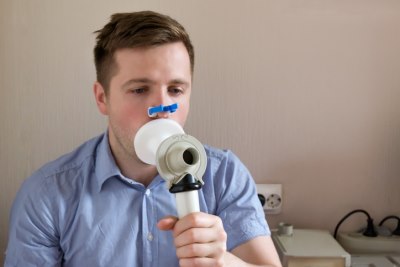Spirometry
 Spirometry is a breathing test used to check how well your lungs are working. The test measures how much air you can move in and out of your lungs, and how fast you can blow air out of your lungs. If you have signs and symptoms of lung disease, your doctor may order spirometry to help diagnose asthma or chronic obstructive pulmonary disease (COPD). Your doctor may use spirometry to check if your lung disease is getting better or worse over time, and whether your medications are helping to control your breathing problems. Other patients perform spirometry before surgery or after occupational exposure to make sure their lungs are working properly.
Spirometry is a breathing test used to check how well your lungs are working. The test measures how much air you can move in and out of your lungs, and how fast you can blow air out of your lungs. If you have signs and symptoms of lung disease, your doctor may order spirometry to help diagnose asthma or chronic obstructive pulmonary disease (COPD). Your doctor may use spirometry to check if your lung disease is getting better or worse over time, and whether your medications are helping to control your breathing problems. Other patients perform spirometry before surgery or after occupational exposure to make sure their lungs are working properly.
Spirometry is a safe and painless test that can be done in your doctor’s office or in a pulmonary function lab. However, you should let your doctor know if you had a recent heart attack, recent chest, abdominal, or eye surgery, have had a collapsed lung, or have tuberculosis.
Before the day of the test, your doctor will tell you if you should stop any medications or inhalers. It may be helpful to wear loose clothing and avoid eating a large meal before the test so you can take a deep breath. On the day of the test, you will sit upright and put a clip on your nose. You will take a deep breath and blow hard and fast into a plastic mouthpiece connected to a machine called a spirometer. Since you will be blowing hard and fast, you may develop dizziness, lightheadedness, or cough. You should let the technician know if you notice any discomfort. The test will be repeated at least three times to make sure the results are consistent. The machine will calculate and graph your results, including measurements known as Forced Expiratory Volume (FEV1) and Forced Vital Capacity (FVC).
After the test, you may be given a medication to open your lungs (bronchodilator) and a repeat test will be performed to find out if the medication improved your breathing measurements. Your doctor will explain what your results mean after the visit.
Click here for more information on asthma.
The AAAAI's Find an Allergist / Immunologist service is a trusted resource to help you find a specialist close to home.
10/31/2023